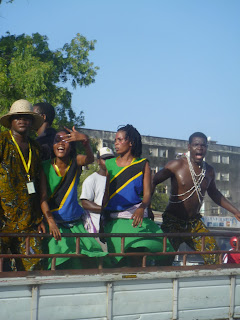We had our first big trip this past weekend and one I had been looking forward to for a while. We went to the island of Zanzibar which is right off the coast of Tanzania. Typically people take a ferry there but because a ferry recently sunk, we took a short 20 minute flight instead.
We left Thursday morning and spent the day exploring Stone Town which is absolutely beautiful. We visited a bunch of historical sites including slave chambers, museums, the Old Fort and the markets. The music festival was also happening this weekend so after a stop for ice cream we went to see the parade. At night we went to the first night of the festival which was actually in the Old Fort. We also went to get sweet Zanzibar pizza. I got nutella and coconut pizza. Delicious.
On Friday we had a Spice Tour. It was a lot of fun and probably my favorite thing from our trip there. We were taken around a spice farm and we were guessing and sampling different spices. There was also this one fruit? ( or flower? I don’t exactly know what it was) that when you crack it open and smash the seeds, it’s pretty much like red lipstick so we had a lot of fun just smearing our faces with it. We also got to see one of the guys climb a coconut tree barefoot. I gave it a try and epically failed ( I think I got like 3 inches off the ground). From some of the leaves there, they made us these awesome hats and little canteen bags too. Then we had a wonderful lunch there made with many of the spices on the farm.
After the spice tour, we headed to our destination for the next couple days, Jambiani village. The hostel we stayed at was owned by Jenny’s friend and was right by the ocean. We got in late afternoon so we just relaxed on the beach for the rest of the day. Some people went swimming which I’m glad I didn’t because everyone that did got some pretty bad side effects. The tide was very high and there was something in the water that was even carried in the wind. That night we all had a weird feeling in our nose even just by sitting by the beach.
The next day was pretty interesting. We all woke up with our eyes completely swollen and our faces feeling scaly. Today even (5 days later) my face still feels like a snake and I got some sort of rash on my chin. Anyways, Christina (the one that owns the hostel) got us some natural remedy after breakfast. We had the put these boiling hot tea leaves on our eyes. I don’t think it helped too much but it was an interesting experience. The rest of the day, we went on a tour of the village itself. We were walking around for hours and it was long, hot and uncomfortable with barely any shade. The houses in the village were very interesting though especially since they make them out of a combination of coral and limestone. We also learned about seaweed farming there. So the ladies in the village have these farms in the ocean where they grow seaweed and sell it to high end cosmetic companies and to the Asian food market. You can see the farms when the tide is far out. When we first heard of this, it seemed like it would be a very good thing for the community, especially in terms of having women get income. However, we met some NGO workers from Norway in the community and they told us about how little the women actually get from this work, how malnourished they are, the health effects and how their work is comparable to slave labor. After we learned more about the Norwegian NGO’s initiatives there, we walked around some more and then went to see the local medicine man.
After that, we walked back and since the tide was still pretty far out we figured it was safe to go swimming. How much the tide goes in and out is pretty incredible. It’s probably at least half a mile. While we were walking to get to the water we had to watch out for the sea urchins and got to see a whole bunch of starfish and the ladies working on their seaweed farms. Unlike the water at high tide, the water when we got to it was perfectly clear, beautiful and definitely refreshing. By the time we started to walk back, the tide had come in a bit and some of the seaweed farms were now underwater. That night after dinner, we sat by the ocean, had a drum circle by a bonfire and watched the moon rise over the ocean horizon. The hostel workers were all very nice and tried to speak Swahili with us, which was definitely very helpful.
On Sunday morning, some of us woke up to see the sunrise. Unfortunately though, the sky was very cloudy and we didn’t actually see much. After breakfast, we packed up and left to go back to Stone Town. We did some pretty touristy shopping (gypsy pants was a must for most of us) and headed back to the airport. The airplanes we took there and back were very tiny, maybe 15 people max. On the way back, I sat next to the pilot up front and even got the fly the plane for a bit which was pretty exciting.
All in all, I would say it was a pretty amazing weekend. Pictures to follow!


















